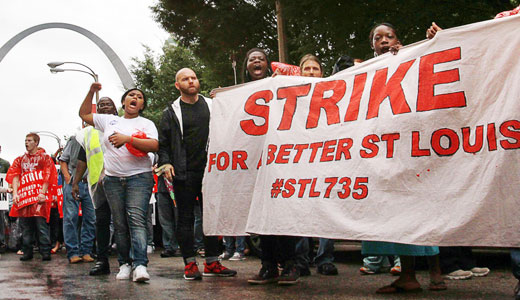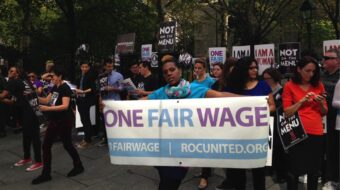
ST. LOUIS – “We are here to help create a climate where the denial of workers’ rights will not be tolerated,” Joan Suarez, co-chair of the St. Louis Jobs with Justice Workers’ Rights Board, said as she convened a public hearing at City Hall here on Oct. 28.
The public hearing was called to draw attention to two recently released reports documenting the high cost of low wages in the fast food industry and to highlight the dramatic series of strike actions by fast food workers across the country demanding the right to form or join a union without retaliation.
The reports, released in mid-October titled, “Fast Food, Poverty Wages: The Public Cost of Low Wage Jobs in the Fast-Food Industry” and “Super-Sizing Public Costs: How Low Wages at Top Fast Food Chains Leave Taxpayers Footing the Bill,” argue that low wages in the fast food industry costs U.S. taxpayers nearly $7 billion annually.
Allan MacNeill, a professor at Webster University, said, due to low wages “49 percent of fast food workers in Missouri rely on public assistance, costing taxpayers $143 million a year.”
“The findings are shocking,” McNeill added, “but not surprising.”
“It’s not surprising because people often wonder ‘How do people live on the money they earn in the fast food industry?’ Well, now we know the answer. They don’t. They have to rely on other sources including public assistance.”
“This is an enormous public subsidy” to already very profitable corporations, MacNeiil continued.
Furthermore, he added, “the estimates are very conservative, and in fact they undercount the actual public cost,” as they only include five of the largest federal public assistance programs, while excluding other federal and state programs.
According to Super Sizing Public Costs the “ten largest fast food corporations alone made more than $7.4 billion in profits in 2012”.
“Taxpayers are directly subsidizing the profits of fast food giants like McDonald’s, Wendy’s and Burger King,” the Rev. Martin Rafanan, told People’s World.
Krystal McLemore, a Taco Bell employee earning $7.65 an hour, said, “big corporations need to be held accountable. I can’t even afford comfortable maternity clothes.”
McLemore – who is six months pregnant with her second child – works 30-40 hours a week, yet still qualifies for food stamps and Medicaid.
Alisha Snider, a Wendy’s employee, earning $7.50 an hour, said, “I rely on food stamps to put food on the table.”
“I work hard every day and I don’t make enough to feed my family and pay all my bills. I receive public assistance not because I want to but because I have to make sure my children eat. Wendy’s should pay us more, so we don’t have to worry about where our next meal will come from.”
Holly Roe, a case worker at the Department of Family Services, said, “too many of my clients are low-wage workers at fast food restaurants.”
Roe, who is also a member of the Missouri State Workers Union-Communication Workers Union of America (MSWU-CWA) Local 6355, said, fast food workers are “disregarded and disrespected” at work, which she calls, “economic bullying.”
“Can we really expect fast food companies who have no concern for their employees to be concerned about the customers,” Roe asked?
The public hearing comes on the heels of a series of fast food worker strikes demanding $15 an hour and the right to form or join a union. During the most recent strike wave, thousands of low-wage fast food workers walked out of restaurants in over 60 cities.
Don Giljum, retired business manager of the Operating Engineers’ International Union Local 148 and a member of the Workers’ Rights Board, told the People’s World, “Fast food workers are taking a stand for all of us. We have to stand with them.”
Photo: An August 27 demonstration by fast food workers takes place in St. Louis. It is one of many that took place in 58 cities across the nation. (Derik Holtmann/AP)












Comments